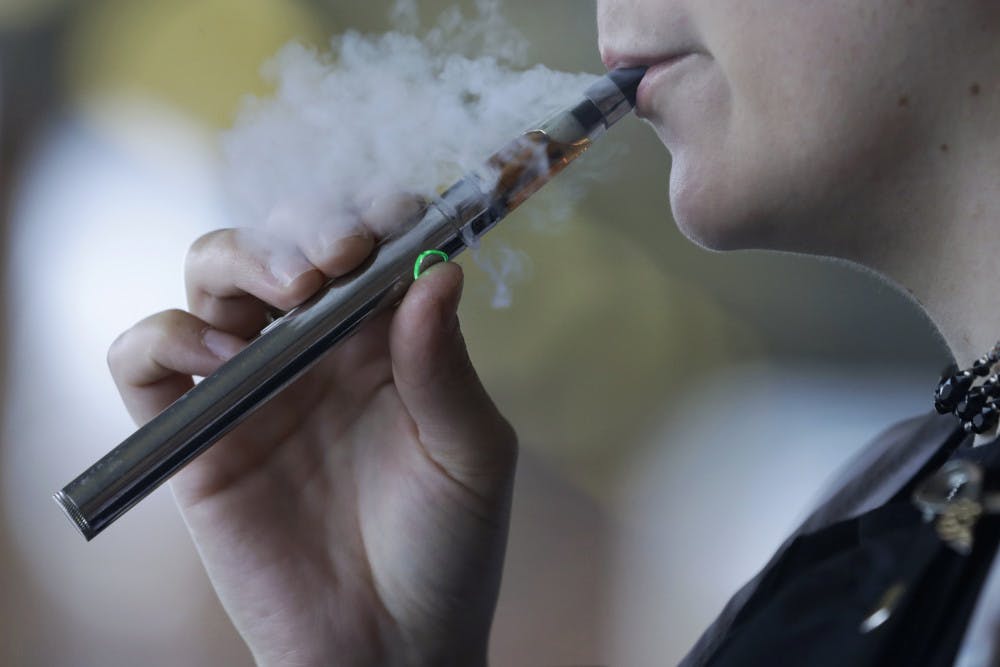It’s a Monday night at White Buffalo bar. A group of fraternity brothers gather in a circle and share some laughs.
All of a sudden, they disappear behind a large white cloud of smoke.
Poof. They return.
But they’re happier, livelier as they remove small black rectangles from their lips. That device is the JUUL.
The JUUL is a battery-operated e-cigarette popular among college students, and UF scholars are no exception. Some use it for stress relief, while others are addicted to the point of branding themselves as “JUUL fiends.”
These so-called fiends may have a hard time purchasing these products, after Alachua County implemented Tobacco 21 on Oct. 22, which raises the legal tobacco purchasing age to 21. The county was the first to issue such an ordinance in Florida, and it may not only impact frequent users but decrease business for local shop owners, too.
On Sept. 9, the Food and Drug Administration issued a warning to all JUUL manufacturers for falsely claiming the products are safer than cigarettes. Tuesday, Florida Attorney General Ashley Moody called on state lawmakers to crack down on flavored vaping products and outlaw advertising that targets minors.
There have been 52 illnesses and one death from vaping in Florida this year, according to the Florida Department of Health. The Center for Disease Control reported that 81 percent of the patients are under the age of 35.

FILE - In this Dec. 20, 2018, file photo Juul products are displayed at a smoke shop in New York. Altria swung to a loss in the third quarter as it wrote down the value of its investment in e-cigarette maker Juul. Altria bought roughly a third of Juul for $13 billion last December. Since then, an outbreak of vaping illnesses - some deadly - has led to multiple investigations, with Juul no longer advertising its products in the U.S. (AP Photo/Seth Wenig, File)
Cecilia Luna, a UF Student Health Care Center communications specialist, said the center first noticed an increase in JUUL and e-cigarette usage in Fall 2018.
“The misconception surrounding the safety of JUULs and e-cigarettes is one of the reasons why we might be seeing an increase in the use of these products,” Luna said.
JUULs carry concentrated liquid nicotine in cartridges with flavors such as mango, mint and creme brulee, according to an October 2018 class-action lawsuit document.
These flavors make the products more appealing to youth, according to the Centers for Disease Control and Prevention. In addition, the percentage of Alachua County kids age 11-17 who vape increased from 1.5 percent in 2012 to 15.1 percent in 2018.
Sreekala Prabhakaran, a pediatric pulmonologist at UF Health Shands Hospital, said the prime age for long term lung damage caused by vaping is between high school and college, as the lungs are still developing.
“I feel responsible as a pulmonologist that we do need to educate the kids in order to help them from ongoing and dangerous situations,” Prabhakaran said. “Otherwise, we are building up a new generation with a lot of problems.”
Dhanashree Rajderkar, UF Health pediatric radiology director, said the majority of lung damage due to vaping occurs where oxygen and carbon dioxide exchange, which can even cause brain damage in the long run.
However, young people often do not admit to vaping, which makes it difficult for them to receive proper treatment, Rajderkar said.
“It’s the responsibility of all the citizens to encounter these problems in teenagers and report them,” Rajderkar said.
Prabhakaran recommended to those who want to stop vaping or smoking to look for free programs offered by Area Health Education Centers (AHEC).
Aydan Arroyo, a 21-year-old UF finance junior, said he still JUULs occasionally despite the research he’s done comparing the extent of toxins in JUULs versus cigarettes. He said he found more toxins go into cigarettes.
“I think it’s getting blown out of proportion a bit, but it definitely proves that it needs to be researched more,” Arroyo said. “It’s safer but it’s not safe.”
Arroyo said he never heard of JUULs until his freshman year at UF, when a friend offered him one. His exposure to them increased when he pledged to a fraternity because it was seen as “the thing to do.”
“I never really felt pressure to do it,” Arroyo said. “But I had extreme availability to try it. I tried it, I kept trying it and the next thing you know I’m addicted.”

A woman walks by 101 Smoke Shop on SW Archer Road.
Alachua County’s new law has affected businesses reliant on college students to purchase these products all over Gainesville.
Mary Ewing, a 61-year-old owner of Escape 2 Vape in Gainesville, said the new law decreased her business by 50 percent. She would get a large number of customers who were 18-year-olds in high school and college as well as customers who were trying to quit cigarettes.
“We were really helping some people,” Ewing said.
Ewing smoked cigarettes for 31 years and would smoke one and a half to three packs a day. She quit six and a half years ago and has been vaping ever since. She said she takes hits of her vape on and off throughout the day.
“It’s the hand-to-mouth motion that’s the hardest to quit, and that’s why I think vaping helps so much,” she said.
She was inspired to open up a shop in Gainesville after her son, who lives in High Springs, said there weren’t many vape shops around for those who wanted to quit cigarettes. She and her husband opened Escape 2 Vape in 2015.
Ewing said they’ve never sold JUUL products in their shop because the pods are pre-filled and they don’t know what the contents are. She said customers have a choice in the amount of nicotine concentration they have in her products, given that JUUL products come with a high concentration of nicotine.
“Vaping is a verb, it’s an action,” she said. “It’s what you’re vaping that makes a difference.”
FILE - In this Friday, Oct. 4, 2019, file photo, a woman using an electronic cigarette exhales in Mayfield Heights, Ohio. A Michigan judge is blocking the state's two-week-old ban on flavored e-cigarettes. Court of Claims Judge Cynthia Stephens issued a preliminary injunction Tuesday, Oct. 15, 2019. She says Michigan Gov. Gretchen Whitmer's administration's delay in implementing the ban undercut its position that emergency rules were needed. (AP Photo/Tony Dejak, File)

Meghan McGlone is a UF junior majoring in journalism and English, and this year she’s the City and County Commission reporter. In past years, she’s served as the University Editor, the Student Government reporter, and other positions. Her favorite past time is eating gummy worms and reading a good book.






